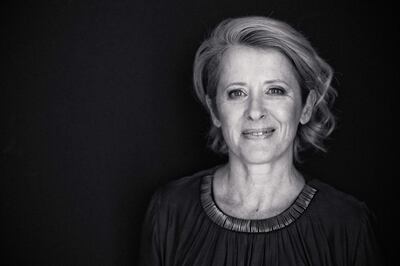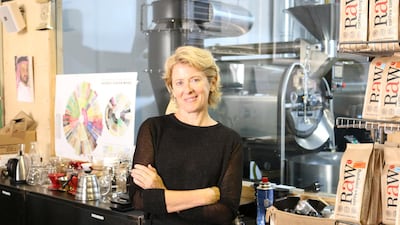Kim Thompson, 56, is the founder and managing director of Raw Coffee Company, a boutique roastery supplying cafes, restaurants, businesses and households in the UAE. The New Zealander has lived in Dubai for 23 years and started Raw Coffee in 2007. Though trained as an oncology nurse, Ms Thompson worked as a cafe manager at Jebel Ali Sailing Club and then started Raw Coffee after becoming frustrated at not being able to find high-quality, ethically sourced, organic, locally roasted coffee in the UAE. She and business partner Matt Toogood opened their first outlet in Dubai Investments Park before later setting up in a converted warehouse in Al Quoz. Ms Thompson has three grown-up daughters – two living in Dubai and one in Bali, Indonesia – and two grandchildren.
How did your upbringing shape your attitude towards money?
I didn’t grow up in a privileged or a wealthy family, but I didn’t know that because we were also really lucky. We were in a town called Nelson in the South Island. We’re on the coast, so there’s a seaport, there are a lot of national parks, it’s a beautiful place to raise a family. We got to do everything that we thought we wanted to do, but we didn’t have any international travel. It was a very lower middle class upbringing.
My father was someone that didn’t want my mother to work – he wanted to provide – but he kept that financial responsibility very much to himself. He didn’t talk about his financial stress and never gave me any financial advice. He had a menswear store selling customised tailored men’s suits and quality shirts. But men in New Zealand didn’t buy a lot of those, because they were made to last. It wasn’t a strong business looking back.
How did you learn about money?
I had to learn the hard way. I left home at 15 to go to nursing college, completely unprepared for the adult world. [After becoming a registered nurse], for the first six months I would spend my salary before it was to last a month. It would all be gone within the first 10 days because I didn’t know anything about budgeting and I definitely didn’t know anything about saving.
What was your first job?
My grandmother worked her whole life in a company called Griffin’s, a confectionery factory that’s quite a well-known New Zealand brand. She helped me get a summer job before I went away to go nursing, to earn some money for my ticket and the other things I would need to get started. It was just before Easter, and I stood on a line with all these lovely middle-aged women sticking chocolate marshmallow Easter eggs together. For the hours worked, the money I earned felt criminally underpaid.
What led you to leave New Zealand?
My ex-husband is an airline pilot. We left New Zealand to go and live in the Netherlands and then we moved to Bahrain with DHL and eventually to Emirates here. That was the big break for him. About 10 years ago we got divorced, but we’re both living here.
Why didn’t you continue your nursing career?
When we came here, the nursing hours were 12-hour shifts and I wanted to be focused on being a mother. At that time it wasn’t easy to find part-time work or job sharing. So I thought the cafe [at the Jebel Ali Sailing Club] would be something I could lead. I didn’t realise it was going to be full-time and all-consuming. But [the girls] were teenagers. I was still very much trying to be a mother, but I definitely had time to be working.
What led you to start Raw Coffee?
I noticed a gap in the market, as it was difficult to source coffee when I was running my first cafe in Jebel Ali. Back then all coffee was imported, so there were no fresh roasters here. There was no support of any kind to maintain the equipment. Espresso machines are like a car – they need to be serviced and maintained. There was no barista training.
I did a business plan and spoke to friends that own small businesses here. I brought on a consultant to help with the early stages. My partner [Matt Toogood] didn’t join me for two years. I made the original investment, but we were both very lucky that we had spouses getting a salary every month. I didn’t take a salary for the first five years and Matt didn't for the first three. We had completely underestimated the amount of money it would take to get going before we had money coming in.
How did you grow the business?
When I first started, we were three people. I recruited my first two employees from the Jebel Ali café and we learnt to be baristas in the kitchen at my house. We’re now a team of 42. We were the first speciality roastery in the UAE – now there are 54. We have nearly 300 commercial customers [such as Leto, Friends Avenue, Bystro Café and Spill the Bean] and then we have about 240 domestic customers that are registered online that will take maybe 500 grams a week that we deliver to.

How has the Covid-19 outbreak affected your business?
We closed the cafe on March 22 following the government guidelines and moved our business to 100 per cent online delivery. We were very lucky that we already had our drivers and our website set up. With the cafes closing and people staying at home, a lot of people would make a French press or a percolated coffee at home.
We have lost 92 per cent of our normal business, but the positive side is that orders are increasing by 20 per cent week on week, and 55 per cent of our online orders are new customers. We are hearing many of these customers have found us by #supportlocalDXB and other local community initiatives.
How will the business manage financially?
We don’t have any debt. Matt and I own the company completely. So I think we’re in a strong position. We can pay salaries for a few months easily and with the deliveries, we have money coming in. We approached our landlord and delayed our rent check for April, because he wants to keep us as a tenant. My business partner, my finance and strategy manager and I all elected not to take salaries this month to keep extra money in the company. We can do that for a number of months without being in great danger. Looking after our team is really important.
Do you have a financial cushion on a personal level?
No, I have no cushion. My whole nest egg is the company. This is such a crisis that I’m focusing on the really important things at the moment and not worrying. I don’t have debts, I’m healthy.
Has Covid-19 affected others in your family?
My ex-husband has now gone on to 50 per cent pay [with Emirates]. He’s working on cargo and freighters now, although he probably will share that load with other pilots.
My youngest daughter, she’s 25, lost her job here. She was working with a professional fashion photographer and obviously when all the shoots started closing down … he just had to let go any staff that he was employing. She lives with me and I’m just really grateful that she’s here with me.
Do you have a retirement plan?
A couple of years ago I finished building a home in Indonesia and that took me about four years to completely pay off, so that was a choice I made to have a base in a country where I could afford to build a beautiful home.
Owning a small business, you’re not going to get a pension fund and I haven’t lived in New Zealand for almost 30 years. The decisions I make with my business are very important, because that’s my retirement.


